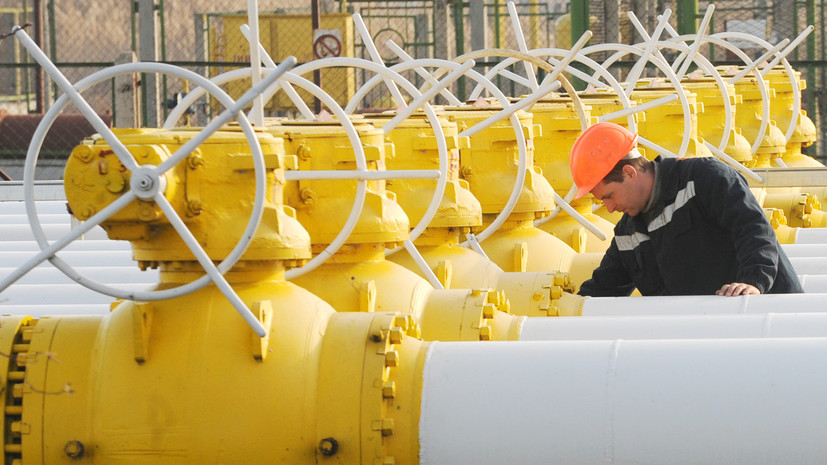Russia and Ukraine agreed to intensify work on gas issues. This is stated in the message of the Ministry of Energy of the Russian Federation following the negotiations in Vienna.
“The parties discussed Russian-Ukrainian cooperation in the gas sector - the settlement of mutual claims for the execution of contracts, the conditions for the transit of Russian gas to Europe from 2020, the prospects for direct purchase of Russian gas for Ukrainian consumers. An exchange of proposals on resolving issues facing the parties took place, and agreements were reached on intensifying joint work in a bilateral format in the coming days, ”the ministry’s website says.
The meeting was held on November 28 in Vienna. In the negotiations, the Russian side was represented by Energy Minister Alexander Novak and the head of Gazprom Alexey Miller, the Ukrainian side was represented by the head of the Ministry of Energy Alexey Orzhel, as well as the management of Naftogaz and the new venture Gas Transmission System Operator of Ukraine.
The Ukrainian Ministry of Energy, in turn, reported that the parties, following the results of the negotiations, agreed to intensify work on a new agreement on the transit of Russian gas to Europe.
“The signing of a long-term gas transportation agreement in accordance with European law and on economically sound terms is a matter of energy security not only in Ukraine, but also in Europe. We, as a reliable partner, must ensure stability and uninterrupted transportation of natural gas to European markets, ”the ministry said.
Negotiations were held in a bilateral format, although the EU usually also participates in them. As a rule, the EU is represented at such meetings by the Vice-President of the European Commission, whose composition was updated in November this year.
The absence of a representative of “united Europe” at the talks may indicate that in the current situation Europe cannot influence the position of Ukraine, said Dmitry Abzalov, president of the Center for Strategic Communications.
“So far, the European position is rather coercive. Europe does not act as a generator of ideas, but as a lever of pressure, including on the Ukrainian position. But the Ukrainian side is inconsistent even within its negotiating position, and Europe so far cannot influence it, ”he told RT.
Difficulty negotiating
The current contract for the transit of Russian gas to Europe through the Ukrainian gas transportation system (GTS) expires on December 31. The parties have repeatedly stated their intention to extend it, however, in connection with this, a number of disagreements arose between them.
In particular, we are talking about a number of mutual claims. Naftogaz demands from Gazprom about $ 3 billion in compensation. The Stockholm arbitration sided with the Ukrainian company, but Gazprom disputes this decision.
Earlier, the director of Naftogaz, Andrei Kobolev, even announced about $ 22 billion - this amount, in addition to $ 3 billion, includes a lawsuit for $ 12 billion and a fine from the Ukrainian Antimonopoly Committee of $ 7 billion.
Other difficulties with concluding the contract are related to the law. Ukraine intends to adopt European rules and norms on the energy issue, and they imply a reform of the current system in the country. At the same time, Kiev demands that a new treaty be concluded already according to European rules.
For this purpose, in particular, a new operator of Ukrainian gas transportation systems was created - European legislation prohibits one company from owning a gas pipeline and from producing, storing and selling gas.
Moscow has doubts about whether Kiev will manage to accept European standards before the completion of the current contract. Russia, according to President Vladimir Putin, is then ready to extend the current treaty for one year so that Ukraine can pass the necessary legislation.
At the same time, the Russian side has repeatedly expressed its readiness to continue transit through the Ukrainian gas transportation system, including in accordance with European law. However, Moscow noted that this requires compliance with a number of conditions.
In particular, Gazprom requires a mutual rejection of lawsuits and claims. In addition, the terms of the new contract should be commercially beneficial to both parties. The Russian company is also urging the Ukrainian side to give a final answer on the issue of direct gas supplies - if they start, consumers in Ukraine will pay 25% less for this energy resource.
Gazprom has previously sent relevant proposals to the Ukrainian side. However, in Kiev, a mutual rejection of claims was called "unacceptable."
In Ukraine, they insist that the contract be concluded on a long-term basis. This statement was made on November 27 by Ukrainian Prime Minister Alexei Goncharuk.
“The first (condition. - RT ) is the European rules. The second is a long-term transit issue, because it is a security issue. Everything else is a matter of negotiations between commercial entities, companies, ”he said.
At the same time, Naftogaz expressed its readiness to conclude a short-term contract for one year, but again, subject to European law.
The soon completion of the current contract is forcing Ukraine to take a more constructive position, said Bohdan Bezpalko, a member of the Council on Interethnic Relations under the President of Russia.
“Most likely, the parties will come to a compromise, but either closer to the expiration date of the current agreement, or after it in a few days,” he said in a conversation with RT. - Kiev, in principle, does not strive for constructiveness, but, having reconciled with the inevitable, will compromise. Maybe he will try to blackmail for some time. But the blackmail of Ukraine is ineffective, Russia does not succumb to this blackmail. ”

